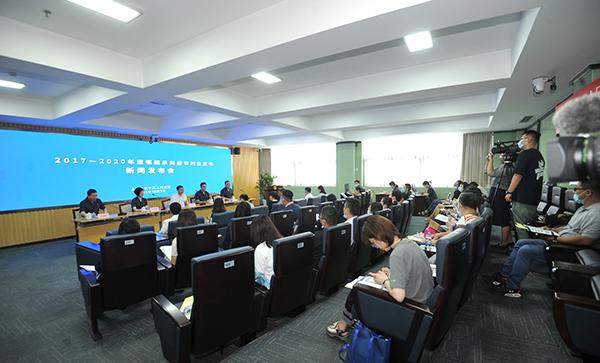Xinmin Evening News (Reporter Tu Yu) This morning, the Shanghai Changning District People's Court (hereinafter referred to as the Shanghai Changning Court) held a press conference to release the court's 2017-2020 white paper and typical cases on the trial of testamentary succession disputes.

Photo: The scene of the press conference Provided by the Changning Court (the same below)
According to the white paper, from 2017 to 2020, the Shanghai Changning court accepted a total of 548 cases involving testamentary succession, involving 608 wills, accounting for 60.25% of the total number of inheritance cases in the same period, and showed the trial characteristics of "six main, four focus, one distribution, and one longer": on the subject, the testator over 60 years old is the main body, and the contradiction focuses on the multimarried subject; on the subject, the tangible property is the mainstay, and the contradiction is focused on large property such as real estate; formally, self-written wills and proxy wills 2. Notarized wills are the mainstay, and the contradictions focus on the wills written on behalf of the will; in terms of quantity, a single will is the mainstay, and the proportion of appraisals involved in multiple testamentary cases is relatively high; in terms of effectiveness, valid wills are the mainstay, and invalid reasons are distributed; in terms of the way of closing the case, the withdrawal and closure of the case is the mainstay, and the trial period is longer.
The white paper shows that at present, there are mainly difficult problems involving four aspects: procedures, subjects, forms and contents, such as difficulty in determining the scope of heirs, difficulty in determining the testamentary capacity of the heirs, doubts about the validity of the will caused by formal defects, and disputes over the validity of wills caused by content defects.
On how to improve the trial effect of cases involving testamentary succession, the white paper puts forward countermeasures and suggestions from the aspects of promoting the traditional family virtues of the Chinese nation, changing the judicial concept of testamentary inheritance, flexible litigation methods, clarifying the rules of evidence, standardizing witness procedures, and grasping the difficulties of trial, so as to actively respond to new issues in judicial practice after the implementation of the Civil Code, and guide and guide the public to integrate the core socialist values into the construction of family teaching style through case trial.
Pictured: Testamentary Law Mandatory Form
The 6 typical cases released on the same day cover common problems such as the determination of the will's ability to do things, the determination of the validity of the printed will, the determination of the "double deficiency" personnel must keep copies, and the determination of the validity of the joint will, etc., clarify the rules through the effective judgment, and on this basis, make six risk tips for the formation of the will, and provide guidance for the legal conclusion of standardized and effective wills:
Tip 1: Adhere to the form requirements for making a will. The Civil Code provides for seven forms of wills, namely: self-written wills, proxy wills, printed wills, audio testaments, video wills, oral wills, and notarized wills.
Tip 2: Prevent ambiguous wording. Where property is disposed of, the words "inheritance" and other words shall be used to clarify the ownership of the estate. The appointment of an executor should indicate the words "executor". Avoid using vague expressions such as "discretionary handling" and "entrusted disposition".
Tip 3: Clarify the testator's capacity to act. The testator must be a person with full capacity for civil conduct at the time of making the will. Evidence can be supported by shooting videos, inviting witnesses, etc.
Tip 4: Avoid witnessing flaws in your appointment. Avoid selecting persons without capacity for civil conduct, persons with limited capacity for civil conduct, and other persons who do not have the capacity to witness, heirs, bequested persons, and persons with an interest in heirs or bequeathed persons as witnesses, and it is recommended to select lawyers, basic level organization staff, and so forth as witnesses.
Tip 5: Keep your share of the inheritance of both categories of people. When making a will, the necessary share of the inheritance shall be reserved for heirs and fetuses who lack the ability to work and have no means of subsistence.
Tip 6: Use joint wills between husband and wife with caution. The law does not clearly stipulate this, which is easy to cause controversy and contradictions. If it is really necessary to make a joint will, it is recommended to clearly stipulate the scope of the change, revocation and revocation of the authority of the party who later dies.